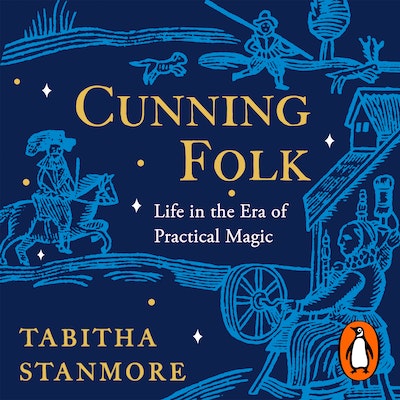- Published: 2 May 2024
- ISBN: 9781529918298
- Imprint: Vintage Digital
- Format: Audio Download
- RRP: $36.99
Cunning Folk
Life in the Era of Practical Magic
- Published: 2 May 2024
- ISBN: 9781529918298
- Imprint: Vintage Digital
- Format: Audio Download
- RRP: $36.99
The best introduction to late medieval and early modern popular magic yet written ... Comprehensive, humane, lively, and a great read
Ronald Hutton, author of The Witch
A fascinating and intricately researched book that opens a window into another world
Tracy Borman, author of Anne Boleyn & Elizabeth I
This isn't just a book: it's a window on the hopes, passions and lives of Europe five centuries ago. We know the horror film version of magic. Tabitha Stanmore - uncovering a whole treasure house of long-lost private lives - adds the rich, fresh, human version
Michael Pye, author of The Edge of the World
Absolutely fascinating. Cunning Folk is a much-needed book that draws attention to a little-known but important aspect of daily life. Like all good history books, it tells us about ourselves as well as the past. It will both inform and inspire readers
Ian Mortimer, author of Medieval Horizons
I adore Cunning Folk. A truly fascinating and human book
Ruth Goodman, author of The Domestic Revolution
Packed with vivid historical anecdotes, this is an intriguing insight into the magical lives of past people and the history of our own superstitions today
Marion Gibson, author of Witchcraft
This is a brilliant book, written with wit and vigour, in which Tabitha Stanmore explores the pre-modern places where magic was real, offering not only practical solutions for ordinary problems but a way of feeling about the world, an emotional relationship between anxious humans, cosmic forces, and the mundane mysteries of their lives
Malcolm Gaskill, author of The Ruin of All Witches
Tabitha Stanmore’s engaging new social history of magic . . . full of such magical tips and colourful vignettes . . . She’s clearly a sharp reader of social realities, and sometimes offers clear-eyed social assessments of why magical rituals had real-world consequences . . . the result is this cheerful, colourful compendium of stories, which crackles with incident
Kate Maltby, Financial Times
Illuminating… Cunning Folk shows us that our forebears were seeking answers through the tools they had
Spectator
An entertaining history of everyday magic in the Middle Ages … charming … packed with anecdotes … Stanmore takes pains to correct many misperceptions about the period [and] persuasively argues that their stories provide a window on the everyday life of premodern Europeans that proves more intimate than other forms of history
Slate
Spirited and richly detailed … With hundreds of colourful incidents drawn from legal records, court chronicles and contemporary accounts, Stanmore hopscotches through history, exploring the uses to which cunning folk were put
New York Times
Eye-opening ... [Cunning Folk] gives a human face to magic in medieval and early modern England, bringing us closer than ever to the hopes, dreams and aspirations of both clients and practitioners
History Today
Rich and lively
New York Times Book Review Editors' Choice
This is a fascinating book, clearly written and illuminating about the psychological necessity of magical thought
Literary Review
Fascinating… Cunning Folk is a page-turner, and tells an absorbing social history beyond the stories of the supernatural
Fortean Times



